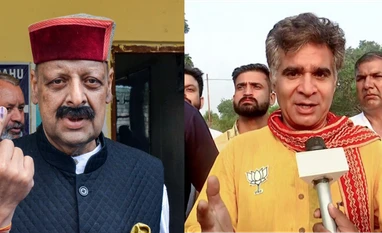Early election trends from the Union Territory of Jammu and Kashmir show the Bharatiya Janata Party (BJP) and National Conference (NC) in a tight contest against one another. While BJP’s Devender Singh Rana is currently leading in Nagrota, Ravinder Raina trails behind NC’s Surinder Kumar Choudhary in Noushera.
As counting continues, the NC-Congress alliance leads in 52 seats, while the BJP is ahead in 26, and others lead in eight.
Jammu-Kashmir Election Results 2024 Nagrota: Devender Singh Rana takes the lead
In Nagrota, businessman and BJP leader Devender Singh Rana is currently leading by a margin of 12,142 votes over the National Conference’s Joginder Singh. Nagrota, previously, Rana won the Nagrota seat in the 2014 elections, contesting from the NC party, where he defeated the BJP’s Nand Kishore by a margin of 4,048 votes.
Formerly a close aide to former Chief Minister and NC leader Omar Abdullah, Rana’s political shift joined the BJP in October 2021. His decision followed growing tensions within the NC, especially after he pushed for the ‘Jammu Declaration’, advocating for greater empowerment and development of the Jammu region. The Jammu Declaration called for a distinct identity for Jammu, separate from the dominant political narratives of Kashmir.
Since joining the BJP, Rana has become the party’s Hindu face in the Union Territory.
Noushera: BJP’s Ravinder Raina trails
Meanwhile, president of the BJP Jammu & Kashmir unit Ravinder Raina is trailing in the Noushera constituency by a significant margin of 11,412 votes. The NC’s Surinder Kumar Choudhary, who left the BJP in July 2023 to join the NC, is currently leading the race.
Raina had earlier defeated Choudhary by a wide margin in the 2014 elections, marking a historic win for the BJP in a constituency long dominated by the Congress Party. Noushera had been a Congress stronghold, winning the seat for eight consecutive terms from 1962 to 2002, before Raina's victory marked the BJP's first-ever success in the area.
Jammu and Kashmir 2014 election results
The three-phase Assembly elections in Jammu and Kashmir across 90 seats concluded on October 1.
The last elections in 2014 resulted in a fractured mandate, with the PDP emerging as the largest party with 28 seats, followed by the BJP with 25. Neither party secured a simple majority, leading to a coalition government that collapsed in June 2018, following the BJP’s withdrawal from the alliance.
With the halfway mark at 46 seats, all parties are vying for crucial victories to form the next government. The outcome of these elections will mark a significant turning point for the region, as it faces its first elections after the abrogation of Article 370 and its reorganisation into a Union Territory.
)

)